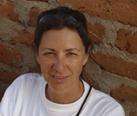Following an outbreak in eastern Chad, MSF is currently vaccinating children between six months and 15 years against measles. As a nurse, Lenny Krommenhoek was part of this vaccination team for five weeks. Following her recent return, she wrote about the enormous logistical challenges she faced during her mission and her very personal experience in this remote part of the world.
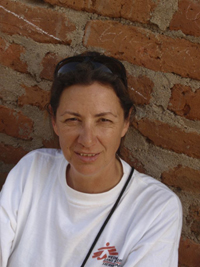
Chad, 2009 © MSF
Nurse Lenny Krommenhoek
Following a measles outbreak in eastern Chad, Doctors Without Borders/Médecins Sans Frontières (MSF) is currently vaccinating children between 6 months and 15 years old. In collaboration with the Ministry of Health, about 135,000 children have already been vaccinated in the district of Abéché; a campaign to vaccinate an additional 90,000 children in the neighboring Adré district at the Sudanese border is currently under way.
Nurse Lenny Krommenhoek was part of this measles vaccination team for five weeks. Following her recent return, she wrote about the enormous logistical challenges she faced during her assignment and her very personal experience in this remote part of the world.
Keeping vaccines cold in 104-degree heat
The area is quite remote, sometimes insecure, and very difficult to travel. The whole team consists of around 50 people, including logisticians, registrars, nurses, and drivers. We travel in battered truck convoys from one base to another, in seven different teams, vaccinating every day. An international team leader manages each team, making sure that we go to the right villages and overseeing the vaccination.
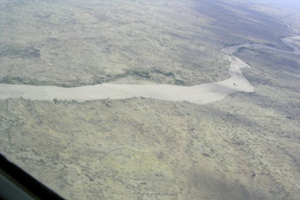
Chad, 2009 © MSF
Aerial view of the remote area where MSF teams are carrying out a measles vaccination campaign.
Another team goes ahead to talk to the village leaders, create awareness, announce our arrival, and find out more about villages, road conditions, how we can maintain the cold chain, whether there is electricity . At a daily meeting between the team leaders and the coordinator, the villages are divided among the different teams.
Of course, logistics are very important. Measles and polio vaccines need to be kept at a temperature between 36 and 46 degrees, so a cold chain—whereby vaccines are kept at a controlled temperature from the point of origin to the villages and to displaced persons camps—is necessary, in an area where the average temperature is about 104 degrees! From our base team in Farchana, two logisticians organize this cold chain and arrange for the vaccines to be transported every two to four days to the field, together with the other necessary items such as materials for injection, autoblocant syringes with needles, food, and water.
“Not much food and sometimes no water”
Being in the area, I am so amazed how people can live in remote places such as this, with not much food and sometimes no water. The food is mostly dough made from millet with some sauce. In the market you see only tomatoes, onions, and peanuts. Meat, rice, and pasta are a luxury. People get water from water sources like open or closed wells or rivers with donkeys, if they have them, or by foot, carrying the water on their heads.
We sleep in the villages, usually just on a mattress on the ground with a mosquito net, so we stay quite close to the people we are vaccinating. Often the children look at us—how we come home after a long and dusty day of vaccinating, take off our shoes and smelly socks, and prepare our beds. Because of the lack of water we often have only drinking water and some water to wash our hands. Of course this is only for a short time but it makes you very aware of how important water really is.
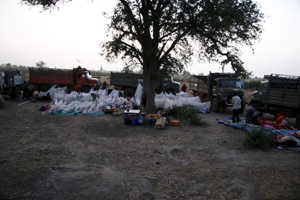
Chad, 2009 © MSF
Trucks surround the staff camp site.
“Children and their mothers gather when we build the vaccination site”
A typical day starts between 5 and 5:30 am when the sun rises. We wake up, pack our beds and private things, put them on the truck, check the truck for essentials for the day, and then have some tea and breakfast and mobilize the team. We clean the site and try to be ready to go at 7 am.
Lots of times we have breakdowns with the trucks. The roads and wadis—sandy riverbeds—are difficult to cross. Then of course there are car parts breaking and flat tires. A good journey in convoy takes us about three hours from one base to another, but we have days that take double the time. We try to vaccinate on travel days, but this of course is not always possible. Erecting a new base requires lots of work: cleaning the place, spreading the plastic sheeting for sleeping, installing the kitchen and toilets.
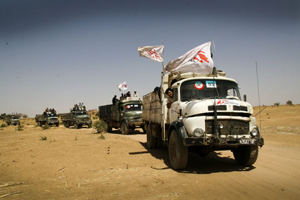
Chad, 2009 © MSF
The MSF convoy heads out from the base in Farchana.
The next day we try to leave the base with our truck at 7 am, with a local driver who knows the area. He leads the way (imagine going with the truck over donkey tracks) and, once we arrive at the village, we speak to the village chief and choose the place for a vaccination site. In some places lots of children and their mothers gather when we build the vaccination site under a tree on the side of the truck. It is very important the building of the site is done properly, so children can get the vaccination in the right way. They also receive vitamin A and polio vaccination. Sometimes we have to change sites more than twice a day because not many children are there.
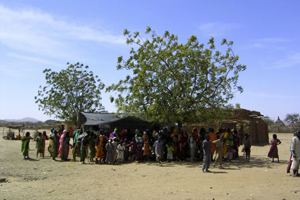
Chad, 2009 © MSF
A vaccination site is set up in one of the villages around Farchana
We have to be back at the base again around 5 pm. Then we tally statistics, make sure the truck is cleaned, and take away empty vials, needle boxes and other rubbish. Around 6:30 pm we have a meeting with all staff. Then we eat and talk about the things that are important for that day. At 9 pm everybody is so tired that sleeping is never a problem.
Coming home after six weeks
We have some time off once a week. We try to get a little bit cleaner, write in diaries, and sometimes walk a bit or find a shop or market. Contact with family and friends is rare because there is often no network and no e-mail facility.
Still, coming home after six weeks, I look back on the vaccination campaign as a really good time with lots of new experiences. I really like the atmosphere of being part of such a beautiful MSF assignment with lots of great colleagues.
Lenny
